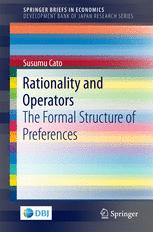

Most ebook files are in PDF format, so you can easily read them using various software such as Foxit Reader or directly on the Google Chrome browser.
Some ebook files are released by publishers in other formats such as .awz, .mobi, .epub, .fb2, etc. You may need to install specific software to read these formats on mobile/PC, such as Calibre.
Please read the tutorial at this link: https://ebookbell.com/faq
We offer FREE conversion to the popular formats you request; however, this may take some time. Therefore, right after payment, please email us, and we will try to provide the service as quickly as possible.
For some exceptional file formats or broken links (if any), please refrain from opening any disputes. Instead, email us first, and we will try to assist within a maximum of 6 hours.
EbookBell Team

0.0
0 reviewsThis unique book develops an operational approach to preference and rationality as the author employs operators over binary relations to capture the concept of rationality.
A preference is a basis of individual behavior and social judgment and is mathematically regarded as a binary relation on the set of alternatives. Traditionally, an individual/social preference is assumed to satisfy completeness and transitivity. However, each of the two conditions is often considered to be too demanding; and then, weaker rationality conditions are introduced by researchers. This book argues that the preference rationality conditions can be captured mathematically by “operators,” which are mappings from the set of operators to itself. This operational approach nests traditional concepts in individual/social decision theory and clarifies the underlying formal structure of preference rationality.
The author also applies his approach to welfare economics. The core problem of ‘new welfare economics,’ developed by Kaldor, Hicks, and Samuelson, is the rationality of social preference. In this book the author translates the social criteria proposed by those three economists into operational forms, which provide new insights into welfare economics extending beyond ‘new welfare economics.’